Boulder faculty members awarded National Science Foundation grants
Two University of Colorado at Boulder faculty members have received prestigious National Science Foundation (NSF) Early Career Development (CAREER) awards.
Assistant Professor Nils Halverson, who holds faculty appointments in both the astrophysical and planetary sciences department and the physics department, was awarded $875,415 over five years from NSF to support detector development and data analysis for cosmic microwave background studies with the South Pole Telescope.
Cosmic microwave background is relic heat from the Big Bang that scientists can detect with microwave-wavelength telescopes. The light is slightly polarized, much in the way sunlight is polarized when it is reflected off the surface of a pond. The polarization signal is expected to contain tiny ripples from gravitational waves set in motion a small fraction of a second after the Big Bang, Halverson said. By measuring the signal, astrophysicists can begin to understand the physics of the universe during its birth.
As part of the NSF award, Halverson and astrophysical and planetary sciences instructor Seth Horenstein will provide a graduate class focused on observations, data analysis and statistics with conceptual assessment tools, peer-instruction exercises and course notes.
Assistant Professor Amy Palmer of the chemistry and biochemistry department received $831,720 from the NSF over five years to support her research to provide a powerful new approach to illuminate disease-causing bacteria like salmonella that invade host organisms and can produce harmful and sometimes lethal effects.
Many bacterial pathogens use a set of proteins called "effectors" to invade and infect host cells, cooperatively working to hijack cellular signaling and to reprogram the host cell to enable bacterial survival. Palmer and her team are developing a new method that will directly tag a broad spectrum of effector proteins with fluorescent molecules in order to visualize their movements during infection of a host cell.
Palmer's project also will contribute to a campuswide effort to reform undergraduate science education by developing and validating interdisciplinary, hands-on tutorials that will promote student engagement and transform student learning. She has worked with the Science Education Initiative on campus, which is part of the university's STEM efforts, to integrate learning assistants into upper division physical chemistry classes, develop pre/post concept tests to measure learning gains and to promote active engagement in the classroom. Palmer also is a faculty member in CU's Colorado Initiative in Molecular Biotechnology (CIMB).


